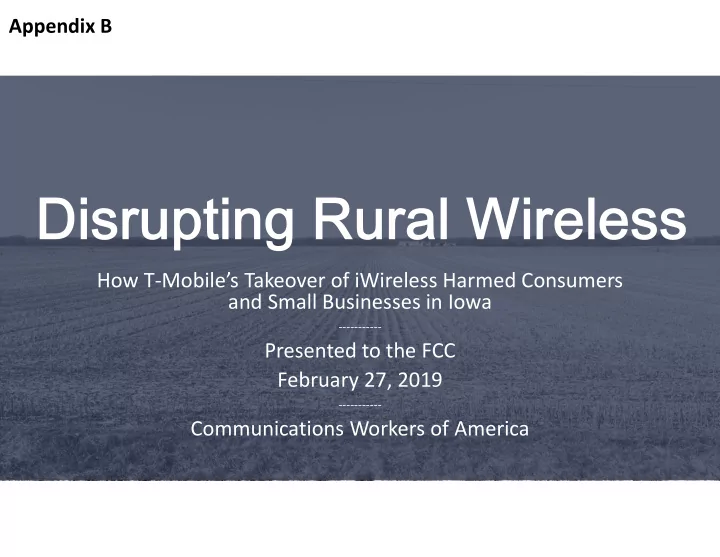

Appendix B How T-Mobile’s Takeover of iWireless Harmed Consumers and Small Businesses in Iowa ----------- Presented to the FCC February 27, 2019 ----------- Communications Workers of America
iWireless overview • iWireless was an Iowa-based regional carrier with approximately 75,000 postpaid and prepaid customers. • Co-founded by a consortium that included dozens of rural telephone companies. • Prior to its acquisition by T-Mobile in January 2018, iWireless operated more retail locations in Iowa’s rural areas than any other carrier. 2
iWireless retail locations, October 2017 3
Applicants’ rural claims • Applicants claim that New T-Mobile will bring choice and competition to rural communities. • T-Mobile’s acquisition of iWireless was a natural experiment which showed that, in reality, T- Mobile prioritized urban and higher-income customers at every opportunity. 4
T-Mobile’s record in rural Iowa • T-Mobile closed 86% of iWireless’ 129 retail locations, including 75 out of 78 locations in rural areas. • One year after the acquisition, there were zero T-Mobile-branded stores outside of Iowa’s urban areas, and only eight Metro-branded prepaid stores in rural areas. 5
Comparison of Iowa retail footprints before and after acquisition 6
Impact on customers “[T-Mobile] left us out in the cold. I don’t like that, I don’t like it for myself, and I don’t like it for my customers, because they matter…They could have just closed one door and immediately opened another one and say, ‘Here is T-Mobile now. You’re covered just like you would be with iWireless.’” -Shelia Hall, former iWireless authorized dealer from Iowa Falls. 7
Impact on customers • Physical retail is an important element of wireless access. As of 2017, almost 90% of wireless devices were purchased at physical retail locations. • Physical retail is particularly important to seniors and low-income customers. • iWireless retail locations provided choice and convenience to thousands of rural customers. 8
Impact on customers • On average, it would take customers 68 minutes, one way , to drive from their former iWireless locations to the closest T-Mobile store. • T-Mobile only retained 22% of iWireless’ customers following the acquisition, 76% of whom were postpaid subscribers. 9
T-Mobile’s iWireless claims T-Mobile claim: T-Mobile dismisses the importance of iWireless, calling it a “failing company stuck in 2G and 3G.” Reality: T-Mobile could have upgraded the iWireless network without gutting its retail footprint. Most former iWireless dealers wanted to continue as T-Mobile dealers. 10
T-Mobile’s iWireless claims T-Mobile claim: Many iWireless locations closed because they were located inside other businesses, and those locations were “outside brand associations.” Reality: Our analysis of data on Metro’s website found that there currently hundreds of Metro dealers that operate from gas stations, tobacco shops, and other independent retailers. 11
The reality of T-Mobile’s rural strategy • The iWireless acquisition provides a real-world test of T-Mobile’s rural strategy. • In this case, T-Mobile prioritized urban and higher- income customers at every opportunity. • Rather than demonstrating its commitment to rural customers, T-Mobile reduced choice and access for thousands of customers in rural Iowa. 12
Recommend
More recommend